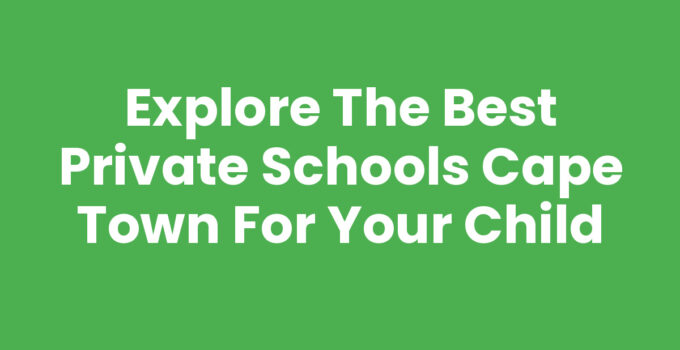Choosing the right school for your child is one of the most important decisions parents face. In Cape Town, private schools offer a range of options that can cater to various educational needs, ensuring children receive quality education and holistic development. This guide will explore the benefits of private schooling, a detailed list of schools in the area, and important considerations to help you make an informed decision.
Private Schools Cape Town: A Step-by-Step Guide
When searching for Private Schools Cape Town, it’s crucial to understand the factors that contribute to a good school environment. This step-by-step guide will help you navigate through your options, providing insights into what to look for.
Step 1: Define Your Child’s Educational Needs
Each child is unique; some may thrive in a traditional academic environment, while others may benefit from Montessori or IB (International Baccalaureate) programs. Assess your child’s learning style, interests, and any special requirements that should be considered when evaluating schools.
Step 2: Research Available Private Schools
Compile a list of private schools in Cape Town based on recommendations, online reviews, and school rankings. Look for schools that align with your identified educational needs. Notable private schools in Cape Town include:
- Reddam House
- The International School of Cape Town
- St. Cyprian’s School
- Herzlia High School
- The American International School of Cape Town
Step 3: Visit Schools
Once you have a shortlist, schedule visits to each school. During these visits, observe the environment, teaching style, and culture. You should also prepare a list of questions to ask school administrators about their curriculum, extracurricular activities, and facilities.
Step 4: Evaluate the School’s Philosophy and Curriculum
Understanding a school’s educational philosophy is essential. Different schools may focus on academics, arts, athletics, or a balanced approach. Explore the curriculum offered, which can range from the National Curriculum to the Cambridge International Curriculum.
Step 5: Consider Extracurricular Activities
Extracurricular programs are a significant part of a child’s development. Discover the range of sports, arts, and community service opportunities available at each school. A well-rounded education encompasses more than academics; character building and life skills are just as important.
Step 6: Assess Location and Logistics
Consider the school’s location in relation to your home or workplace. Ensure that transportation is feasible, especially if you’re considering long commutes. Additionally, verify the school’s schedule aligns with your family’s needs.
Step 7: Financial Considerations
Private schooling can be costly. Understanding tuition fees, additional costs for activities, and any financial assistance programs available is vital in making your decision. Some schools offer scholarships based on merit or need, so inquire about these opportunities.
See Also: Delicious Vegan Restaurant In Cape Town: A Must-Try Guide
Benefits of Private Schools in Cape Town
Private schools in Cape Town provide several advantages that can benefit your child’s education:
- Smaller Class Sizes: With a lower student-to-teacher ratio, educators can provide more personalized attention to each student.
- Innovative Teaching Methods: Many private institutions adopt innovative and flexible teaching methods that cater to diverse learning styles.
- Specialized Programs: Private schools often offer specialized programs, such as arts, sports, or technology-focused curriculums.
- Strong Community and Networking: These schools often have a tight-knit community of parents and alumni willing to support students’ endeavors.
Important Considerations When Choosing Private Schools
While private schools offer numerous advantages, it’s essential to also consider potential drawbacks:
- Cost: Tuition fees can be a significant burden for families. Always analyze your budget and explore aid options available.
- Social Diversity: Some private schools might lack socio-economic diversity, which can impact your child’s worldview.
- Homework Load: Private schools may emphasize higher academic standards, which can lead to increased homework and pressure.
Ultimately, the choice of a private school should align with your child’s needs and your family’s values. By considering various factors and engaging in thorough research, you can find the right educational environment in Cape Town that promotes your child’s growth and success.
Recommended Guide: Montague Gardens Cape Town 7441
Conclusion
The landscape of Private Schools Cape Town is rich with options that can cater to a range of educational needs and preferences. By following the outlined steps and carefully evaluating each school, parents can make an informed and confident choice that will benefit their children for years to come.
Further Reading: Discover the Rich Heritage of the University Of Cape Town
Frequently Asked Questions
What are the benefits of attending private schools in Cape Town?
Private schools in Cape Town offer smaller class sizes, innovative teaching methods, specialized programs, and a strong community.
How do I choose the right private school for my child?
Assess your child’s needs, research available schools, visit them, evaluate curricula, consider extracurriculars, and review financial aspects.
Are there scholarships available for private schools in Cape Town?
Yes, many private schools offer scholarships based on merit or financial need. It's best to inquire directly with the schools.



